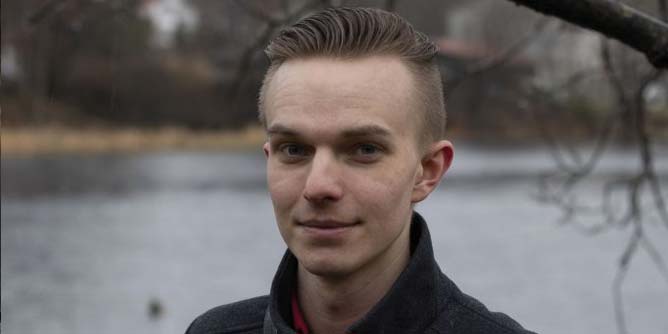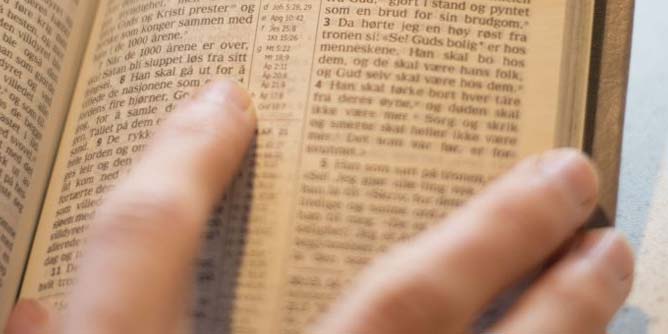A former member of Jehovah’s Witnesses speaks of life inside the group. It is a story of fear, shame and a family that no longer wants contact.
Story originally published on Studvest by Eirik Wichstad. Photos by Line Magde Lunde Hatleskog
Dennis Langedal (23) chose to break with the Jehovah’s Witnesses. He had to pay dearly for that.
“It was like being at my own funeral. I knew this was the last time I had anything to do with them. Never see them again, never talk to them, no contact with either mother, father, siblings, or grandparents. But I was sure of one thing: it’s worth it.”
Dennis Langedal (23) talks about his breaking with the denomination known as “Jehovah’s Witnesses”. It’s no more than a barely year since his life was turned upside down. The break was instant. According to the Christian religion, believers should avoid contact with worldly people, that is, non-believers. The website of Jehovah’s Witnesses explains how members should relate to those who are expelled.
“We do not automatically disfellowship someone who commits a serious sin. If, however, a baptized Witness makes a practice of breaking the Bible’s moral code and does not repent, he or she will be shunned or disfellowshipped. The Bible clearly states: “Remove the wicked man from among yourselves.” – 1 Corinthians 5:13”
“I thoroughly reflected on my choice. Of course, I considered the possibility of not leaving and keeping quiet about the fact that I no longer believed. Then I would still have contact with my family, friends and the social network I had – and that meant a lot. When all my life had been in the Jehovah’s Witnesses, I’d have been living a lie, a life of bondage. I couldn’t do that.
We are sitting at a cafe in the Sletten Center. The gray concrete block is only a shade darker than the sky above us. The rain beats down and the wind alternates between tearing and uprooting the trees outside. From here we have a view of the Tveitevannet. That’s where Dennis used to go round when he preached with the Jehovah’s Witnesses.

The Preacher from Sletten
He pulls on the corners of his mouth and smiles with his eyes. In a quick turn, the conversation alternates from dark to cheerful. Dennis liked the preaching. Undeniably, he went door to door to distribute brochures with information about Jehovah’s Witnesses. He is the type who appreciates a good discussion, especially when he holds the minority position. That was pretty much always.
“My opinions went against what most people thought. Still, I was firmly convinced that I was right. They were, after all, founded on the world view I had, and the norms that I had acquired in the congregation. But I was keen to listen to the people I was talking to.”
It was this curiosity that would become the seed of his upcoming showdown with his own religion.
Dennis had been on a preaching trip in Uganda. Upon returning home, he was filled with a new zeal for the preaching work and would be more dedicated than before. He wanted to expose himself to criticism of religion to strengthen his own faith. Then he began to read about what in the Jehovah’s group is called “apostate literature,” that is, books or other sources that compromise belief in Jehovah’s Witnesses. Gradually, the counter-arguments began to grow on him. In the end, he had completely lost faith. Now he saw aspects of the Christian environment he belonged to in a new light.

Doomsday on a teaspoon
The world view of Jehovah’s Witnesses states that the world we live in is controlled by Satan. Central to this idea is the view that the end time is near. This they call Armageddon and means Judgment Day or God’s war of destruction. Those who are loyal to Jehovah, that is, God, get into Paradise, while those who violate Jehovah’s laws will be killed in the war of destruction. Neither will children be spared.
Dennis is particularly critical of the fact that children get this story on a teaspoon, as he puts it. In Jehovah’s Witnesses’ own children’s book, “My Book of Bible Stories”, there are illustrations of corpses, stonings, strangulation, and people drowning. The scenario of Armageddon is being introduced early. It terrified him.
That fear also characterizes the culture within Jehovah’s Witnesses, he believes. Dennis says that there is an internal justice system in the congregation. If you violate the moral laws, you yourself must admit it to the so-called “elders” – similar to priests – in the congregation you belong to. If another from the Christian community knew it, you can be assured that he would tell it to them anyway. Everyone is acting out of a sense of duty, he explains.
Forgiveness or Expulsion
He says that in his teens, after looking at porn, he experienced what this internal justice system meant. Full of shame, he went to the congregation elders. There he laid out what he had done. In his case, as in other cases, the process is to form a judicial committee, where they discuss whether the case is serious enough that there is a basis for expelling the member.
If the member who has committed “an offense” expresses sincere regret, they are usually forgiven. Either way, at the next church service, it will be informed from the pulpit that a case has been dealt with and a reprimand has been given for the deed. Rather than expulsion, it is more common for the member to be sanctioned with milder means, such as being deprived of privileges or positions of trust in the congregation, Langedal explains.

Tough love
He also has another objection against the Jehovah’s Witnesses. According to their teachings, believers should not receive blood transfusions. Most people go around with a card in their wallet that says the patient does not want to receive a blood transfusion, for example if he / she gets into a serious accident. On the card, two other people from Jehovah’s Witnesses are authorized to fulfill the person’s wishes.
Dennis shows us a group on Facebook of those who are expelled. There, they share the tragic stories of brothers, sisters, and children who have had to pay with their lives in a situation where they could have survived, because it is against the religion to accept blood. There are stories as well of children who have committed suicide because of trauma caused by Jehovah’s Witnesses. Here is a post published by a repentant father:
“Our son committed suicide in 1998, in our home. He was 19 years old. I raised him according to Jehovah’s Witnesses’ rules and read a Bible verse to him about tough love the night before he died. The blame will be on my shoulders for the rest of my life, but I don’t dwell on it all the time. Later, my oldest brother refused a blood transfusion at the hospital. I just hate this damned religion.”
Life after Jehovah
Now Dennis has taken up subjects at the private student school, Sonans. He works to get good enough grades to enter the psychology study. The school gives him something to be concerned about. The time after leaving the religious group he describes as lonely. Missing his family and friends is a heavy burden to carry, but he doesn’t feel bitterness, he says. He has nothing to say about those in the group. It’s the organization Dennis is having trouble with.
Now that he has rid himself of the idea that this life is only a temporary stay in Satan’s world, it is easier to be present in his own life. His goal is to use his psychology education to help others who have experienced crises.